- Home
- Chris Ryan
Strike Back Page 6
Strike Back Read online
Page 6
‘Bollocks,’ snapped Sandy. That anger again, noticed Porter. It was like sitting opposite her mother a lifetime ago. ‘No one’s better off without a parent. It doesn’t matter how useless they are.’
‘I’m the exception,’ snarled Porter.
‘No you’re bloody not,’ said Sandy. ‘Nobody’s an exception, not you, not anyone. You’re the only dad I’ve got. That’s probably bad luck on both of us, but we’re just going to have to live with it.’
Porter paused. She was looking straight at him, and he could feel the pride swelling up inside him again. But what was the point? he reflected bitterly. How could he have a relationship with her now? What was she going to do, come down for the weekend and kip down underneath whatever archway he found himself sleeping under? Trudge around town while he looked for some work washing dishes? Maybe meet some of his mates, like the Scottish blokes. Other divorced dads could take the girls skiing, whizz them around in their Jaguars and Land Rovers. Not me. I would offer her everything I have. Except I’ve got nothing, and how can you offer someone that?
‘It’s not going to work,’ he said flatly. ‘Life hasn’t gone straight for me, not for a long time. It’s not going to change now.’
‘It can change for anyone.’
Porter smiled. ‘You’re young,’ he said. ‘It’s easy to believe that. I’m forty-five years old. This is what I am. There’s nothing to be done about it now.’
Sandy was already fishing around in her handbag. She took out a crisp wad of notes and pushed it across the table. ‘Here’s a hundred pounds,’ she said. ‘There’s nothing wrong with you that a good shower and something to live for won’t fix. Get yourself bloody cleaned up, and start being a proper father.’
Porter pushed the money away. ‘Where did you get that?’ he said.
‘I saved,’ Sandy said. ‘Holiday jobs. Now take it, it’s yours.’
‘I can’t.’
Sandy stood up, and put her coat on. ‘You can and you will,’ she said. ‘You’ve let me down once. Now don’t do it again. When you’ve sorted yourself out, you can contact me at our old address. We haven’t moved.’
She lashed the belt on her coat angrily into place, and started walking towards the door. A couple of guys looked over from the TV with leers on their faces, but then went back to watching the TV. Porter took the bacon sandwich, and ate it in a couple of mouthfuls. Sandy had only nibbled on hers, so he ate that as well. It was the first proper food he’d had all day, and it started to make him feel better. All I need now is a drink, he told himself.
He started walking. The café was round the corner from the station, and there were people pouring back into Waterloo even at this time of night. If you walked due south, there was a pub Porter sometimes went to, on the rare occasions he had money. The Three Kings stayed open to the small hours, and didn’t mind what you looked or smelt like. The place didn’t look or smell of much itself, so it could hardly start getting fussy about other people’s appearance. There was plenty of vodka behind the bar, and so long as you had money in your pocket they’d keep serving it to you until you fell over.
A blast of cigarette smoke hit him as he stepped through the door. When they got around to banning smoking in public places, the Three Kings wasn’t going to pay any attention. Nobody worried much about the law in here, and if the police ever raided the place, there would be a lot more than smoking bans to worry about. There were maybe two dozen blokes standing around the bar, a couple of whom Porter recognised: they were both ex-forces guys who, like himself, had fallen on hard times and spent their lives drifting in and out of hostels. Porter nodded in their direction, but didn’t say anything. Like most people at the Three Kings, he was here to get drunk. As quickly as possible.
‘A vodka,’ said Porter, looking across at the barmaid. ‘In fact, make that a double.’
He looked at the glass of pale liquid. I’ve seen the bottom of a lot of glasses, he thought to himself, but I’ve rarely seen anything as clear as I see this. There’s no way back for me. I just have to forget about Sandy, the same way I did all those years ago. And pretty soon, she’ll forget about me as well.
Taking a hit of the vodka, he threw it down the back of his throat. He felt the warm, smug embrace of the alcohol starting to take hold of him as the vodka swirled through his bloodstream. He could feel his muscles start to relax. And the questions in his mind started to beat less ferociously, like a storm blowing itself out. After all, he repeated to himself, how the hell could a guy like me get his life back on track? It’s all very well Sandy saying I can change now. But what does she know about life? She’s just a kid.
He looked towards the TV in a corner of the pub. At least a dozen guys were sitting around it, their beers in their hands. More Katie Dartmouth nonsense, Porter reflected. The whole country’s going crazy.
He took a step forward, his vodka glass still in his hand. The newsreader had already talked about how frantically the security services were searching for any clues to her location. There was an Arab guy on the TV. According to the strapline, his name was Hassad Naimi, and he was one of the senior commanders of Hezbollah who had taken Katie hostage. He’d been filmed on a webcam, and the footage had been broadcast by al-Jazeera. He was explaining how Katie was going to be beheaded on Saturday night. The execution would be broadcast live on the Internet. ‘Unless the British war criminals take the infidel invaders out of Iraq and Afghanistan by this hour, then she will die,’ he was saying, looking straight at the camera. ‘I say to the people of Britain, her fate is yours to decide. Tell your leaders it is time for your soldiers to come home. Or the blood of Katie Dartmouth will be on your hands.’
Porter watched him speaking. He was not even really listening. He was just looking at the man’s face. He watched his soft brown eyes as he spoke. And he watched the lower lip tremble and shake as he stuttered out each sentence.
The lip was deformed. Badly deformed.
Jesus, thought Porter. I know that bastard.
Heading back to the bar, Porter ordered another vodka. He threw it down his throat in one gulp then signalled to the barmaid to pour him another.
I know that bastard, he repeated to himself.
It’s the same kid I spared in that basement back in Beirut seventeen years ago. The kid who went on to kill Steve, Keith and Mike.
Porter gripped the third vodka but didn’t drink it.
Maybe Sandy’s right. The thought hit him with the force of a hammer. Maybe, just maybe, there is a way back for me.
He put the vodka back on the bar. Turning on his heels, he started to walk through the doors, and out into the cold, dark streets. The chords of ‘Someone Saved My Life Tonight’ were crashing through the pub as Sky News flashed up a picture of Katie Dartmouth and faded into the ads.
Just for once, Elton, thought Porter with a wry smile, you might be right.
FOUR
The river looked better in the morning, Porter thought. The tide was high, and the water was lapping right up close to the barricades. A couple of tourist boats were heading down towards Greenwich for their first run of the day. Sunshine was breaking out across Battersea Park, sending shafts of brilliant light skimming out across the water. Hell, we all look better at dawn, Porter told himself. The day is still fresh, and we can still hope.
He glanced up at the headquarters of the Firm, right next to Vauxhall Bridge. He’d walked past it a thousand times during the few years he’d dossed down in the area. Until he saw Sandy again, and realised how much she’d missed him, it had never occurred to him to go inside.
I thought my soldiering days were buried. Until now.
Porter checked himself in the reflection from a phone box. Not so bad, he decided. After leaving the pub, he’d found a quiet spot close to the bus depot, and bedded himself down among some tossed-out cardboard boxes. He hadn’t slept well, but then he never did. At five in the morning, he’d walked a mile down to the Asda superstore on the road that snaked towards Brixto
n. The place was open all night, it was as cheap as dirt, and they didn’t mind what the customers looked like. Porter picked himself out a new pair of jeans, a white shirt, some socks and trainers, and a sweater. The whole outfit came to thirty quid. He slipped into the toilets, washed himself as best he could in the sink, then put on the new clothes. He tossed the old ones into the bins outside, then went to the café and blew another fiver on a full English breakfast, and a jug of coffee. The water, at least, was free. By the time he’d finished that, he felt almost like a human being again.
He glanced one more time at the Firm. The office was deliberately forbidding: a mass of turrets and spikes, with a huge inner courtyard. There were a dozen armed and uniformed police officers at the entrance, and no doubt twice as many plain-clothes men keeping an eye on it as well. There was no building in London more heavily guarded. Don’t worry about it, Porter told himself. You can do this. It’s just a matter of holding your nerve.
He walked steadily towards the building, at an even, unvarying pace. Run into this place and they were likely to gun you down. Looking across the river to the clock on Big Ben, he noted that it was just after seven in the morning. Early. But the spooks never slept. And certainly not when they were in the middle of a crisis.
The policemen looked at him suspiciously as he walked across the driveway, and into the entrance lobby, but they made no attempt to stop him. It’s a public building, Porter reflected. They have to at least let people walk into the place. It was only once you checked in at the desks that they ran you over for guns and knives.
The foyer was decorated in grey, with slate floors, and a bank of glass at the front. Marble-clad walls led up to a bank of elevators. Along one side there was a reception desk with three uniformed guards sitting at it. At the other, there was a pair of black leather sofas, and a collection of the day’s papers spread out on a coffee table. All of them, Porter noticed, had pictures of Katie Dartmouth on them. ‘BRING OUR BOYS HOME TODAY’ said huge letters across the front page of the Independent. ‘SAVE HER’ said the Mirror.
Porter walked steadily up to the desk. A thickset man in his forties looked straight at him, his expression as welcoming as a chunk of granite.
‘I know how to get Katie Dartmouth out,’ said Porter.
Even as he delivered the sentence, Porter knew how ridiculous he sounded. If it wasn’t for the fact he knew it was true, he’d be laughing at himself.
The receptionist looked at him, taking half a second to make a judgement, and then reached underneath his desk to press a button. Even though he was trained to remain impassive, Porter could tell he had already reached his own verdict. He thinks I’m a nutter. Who know, maybe he’s right?
Five armed officers appeared from the door that led away from the elevators. They walked quickly across the slate floor. Not running, but moving with purpose. A few people were coming through the entrance doors, heading towards the lifts to get to their desks, but they simply made way for the armed men, paying them no attention. ‘We’ll have to ask you to leave, sir,’ said the first officer, standing in front of Porter.
He glanced at the man’s face. It was expressionless, like rock. He was wearing no uniform but he didn’t need to. There was an MP-5 assault rifle strapped to his chest, and that gave him all the authority he needed.
Porter looked straight into his steely blue eyes. ‘I know how to get Katie Dartmouth out.’
He could see the man’s reaction in his face. Nutter, he was thinking. Just like the other guy. But he remained silent.
‘I can get her out.’
‘This way, please, sir,’ said the officer.
Porter could feel his chest thumping. This was his one chance to show Sandy he could amount to something. To look her in the eye without feeling ashamed of himself. He’d no more throw it away than he’d throw away his own life.
‘I’m the only man who can get through to her kidnappers,’ Porter shouted.
He could see a few of the office workers looking at him distastefully before hurrying on. None of them wanted to hear what he was saying, and none of them were looking in his direction. The five guards were slowly closing in on him, forming a tight semicircle from which there was no chance of escape.
‘This is your one chance to save her,’ said Porter. ‘I was SAS, I know something about the man who’s holding her, something we can use.’
He could feel a hand grabbing hold of his arm. The MP-5 wasn’t jabbing into his chest, but it was definitely pointed in his direction, and the expression of the man with his finger on the trigger suggested he wouldn’t hesitate to use it if he had to. They were starting to move him towards the door. Porter shrugged himself free. These goons weren’t going to listen to anyone, he reflected bitterly. Osama bin Laden could walk through the door offering to turn himself in, and they’d tell him to come back when he’d made an appointment. ‘I can walk,’ he growled.
A fresh blast of cold air struck Porter in the face, as he stepped out into the morning air. A gust of wind was blowing through him. It can take my hopes and blow them away, Porter told himself. I must have been mad to think they would listen to me.
‘Don’t come back,’ said the officer firmly.
A Jaguar was pulling up outside, and a man in a charcoal-grey suit was climbing out of the back seat. Porter recognised him at once. Sir Angus Clayton, the director general of the Firm. Porter had seen his picture in the papers he sometimes fished out of the bins he slept next to. He might even have used his mugshot as a blanket once or twice. A tall man, with a fast-disappearing head of black hair, and a face that was shallow and drawn, he looked tired even though he hadn’t started work yet. Porter was standing only a few yards away from him. If I don’t take this chance, he told himself, then I’ll never get another.
‘I can get Katie Dartmouth out for you, Sir Angus,’ he shouted.
The man looked at him. His eyes were focused, intent, as the words struck home. He was assessing Porter in an instant, scanning his face, using a lifetime of experience in the intelligence trade to make a snap judgement on whether the man might be worth listening to. He slammed the door shut on the Jaguar, and started walking towards the entrance doorway.
The guard was tightening his grip on Porter’s arm. ‘We’ve already asked you to leave, sir,’ he snapped.
Porter took a step forward. ‘One minute of your time,’ he said. ‘That’s all I’m asking for.’
Sir Angus kept walking towards the revolving glass door that led into the Firm’s headquarters. From the expression on his face, you couldn’t even tell if he had heard Porter.
‘If you make any more trouble, sir –’ started the guard.
Porter shrugged him aside.
‘That woman is going to die in five days’ time, Sir Angus,’ said Porter. ‘And I’m the only man who can do anything about it.’
The guard was tugging him back.
‘One bloody minute. I’m SAS, I’m –’
‘Sir, you are risking arrest,’ the guard said.
Sir Angus paused. His hand was already pushing the revolving door open, but his feet had stopped moving. Slowly, he turned round. His eyes were looking straight at Porter, questioning and probing at the same time. ‘You’re Regiment?’
Porter nodded.
‘What was the code name of the Firm’s liaison officer in Hereford in 1990?’
‘Zebra, sir,’ replied Porter, without a flicker of hesitation.
‘And do you keep in touch with Jim West?’
‘Not likely, sir,’ replied Porter. ‘The bloke died on a black op in Somalia.’
I’ve passed the test, thought Porter. Only a Regiment man could answer those questions.
‘A minute is too long,’ said Sir Angus quietly. ‘I’ll give you thirty seconds.’
The guard let go of Porter, but he was still standing just a couple of feet behind him, and his gun was still cocked, ready to drop him if he created any trouble. Porter paused. Thirty seconds, he told himself. Bett
er make this good.
‘In 1989, I was in the SAS,’ he said, his tone confident and strong. ‘There was a hostage-rescue mission in Beirut. A guy called Kenneth Bratton. There was a young kid, one of the Hezbollah boys. I spared his life. It’s that Hassad bloke, the one who is holding Katie Dartmouth hostage. I recognised him because of the deformed mouth.’ Porter paused, looking straight into Sir Angus’s eyes. He could tell he’d caught his interest: whether he’d convinced him or not it was impossible to say. ‘He’ll talk to me, because he owes me,’ he continued. ‘I know it might not work, but it’s worth a try, and what else have you got? If you’ve got a secure line to him, tell him there’s an SAS guy with two fingers missing on his left hand. Tell him I want to come and talk to him.’
Sir Angus glanced down at Porter’s left hand. He could see at once the two stumps where his fingers used to be. He rubbed his brow as his face creased up into a frown.
Porter could feel his heart thumping against the walls of his chest. ‘I’m on the level,’ he said. ‘I was Regiment. You can check my records.’
Sir Angus hesitated. ‘Here’s what I’m going to do,’ he said. He nodded towards the guards. ‘These gentlemen are going to take you to a secure room. A case officer is going to come down and check out your story.’
‘Thank you, sir,’ said Porter.
‘But let me tell you my terms,’ Sir Angus continued. He was already starting to turn back to the revolving door. ‘If you’re wasting our time, I’m going to get them to beat the bloody hell out of you, then take you to the back of this building, and feed you to the sodding fish. Got that? You can leave now if you want –’
‘I’ll take those terms,’ said Porter with quiet determination.
FIVE
On the table in front of him, there was jug of coffee and a plate of biscuits. Porter took the jug, and poured himself a third cup of coffee, drinking it down in a couple of gulps, then eating another of the biscuits. He’d have polished off the whole plate in the next few minutes, he realised. When you lived on the streets, you ate your food quick, before someone stole it, the same way a wild dog does.

 Global Strike
Global Strike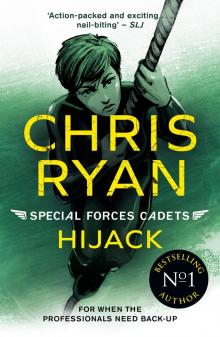 Hijack
Hijack Special Forces Cadets 2
Special Forces Cadets 2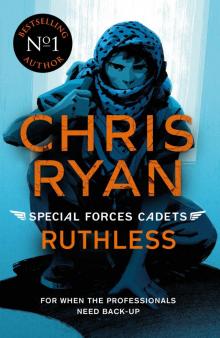 Ruthless
Ruthless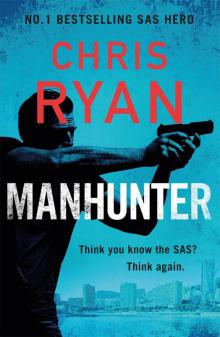 Manhunter
Manhunter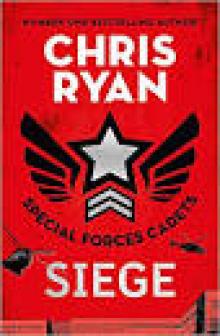 Special Forces Cadets 1
Special Forces Cadets 1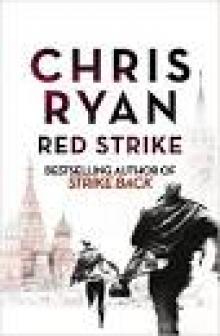 Red Strike
Red Strike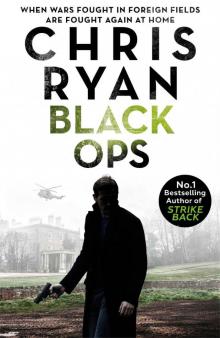 Black Ops
Black Ops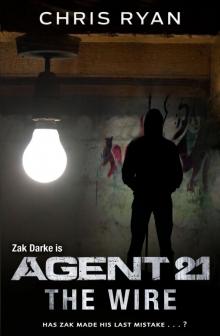 Agent 21: The Wire
Agent 21: The Wire Land of Fire
Land of Fire Alpha Force: Fault Line
Alpha Force: Fault Line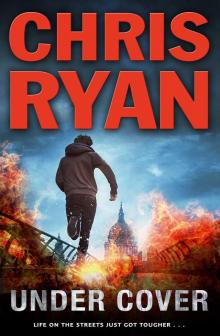 Under Cover (Agent 21)
Under Cover (Agent 21) Endgame (Agent 21)
Endgame (Agent 21) Red Centre
Red Centre Blackout
Blackout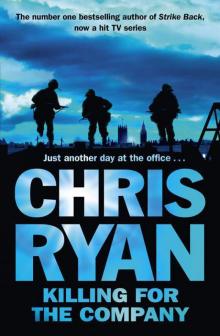 Killing for the Company
Killing for the Company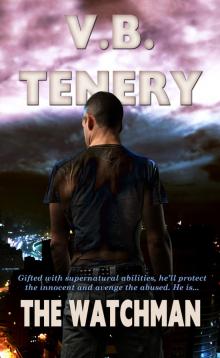 The Watchman
The Watchman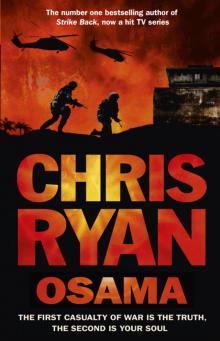 Osama
Osama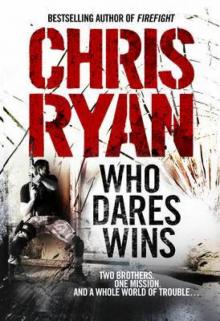 Who Dares Wins
Who Dares Wins The Kremlin Device
The Kremlin Device Hunter Killer
Hunter Killer Alpha Force: Untouchable
Alpha Force: Untouchable Stand By Stand By
Stand By Stand By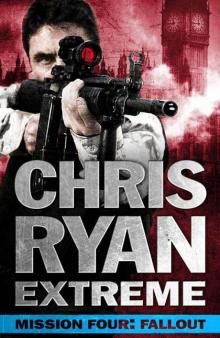 Chris Ryan Extreme: Hard Target: Mission Four: Fallout
Chris Ryan Extreme: Hard Target: Mission Four: Fallout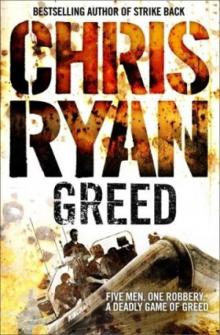 Greed mb-1
Greed mb-1 Alpha Force: Desert Pursuit
Alpha Force: Desert Pursuit Strike Back
Strike Back Greed
Greed The Bay Bulls Standoff
The Bay Bulls Standoff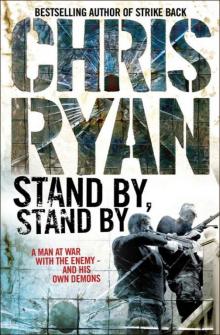 Stand By, Stand By gs-1
Stand By, Stand By gs-1 Outbreak
Outbreak Hunted
Hunted Vortex cr-4
Vortex cr-4 Rat-Catcher
Rat-Catcher Vortex
Vortex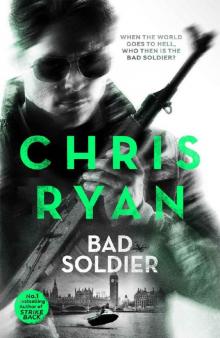 Bad Soldier
Bad Soldier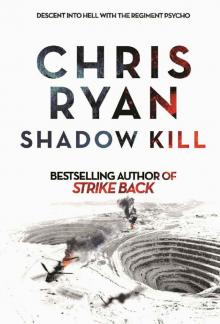 Shadow Kill: A Strikeback Novel
Shadow Kill: A Strikeback Novel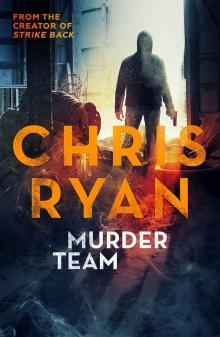 Murder Team (Kindle Single)
Murder Team (Kindle Single) One Good Turn
One Good Turn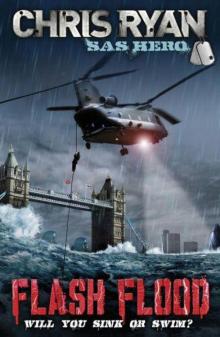 Flash Flood cr-1
Flash Flood cr-1 Night Strike
Night Strike Wildfire
Wildfire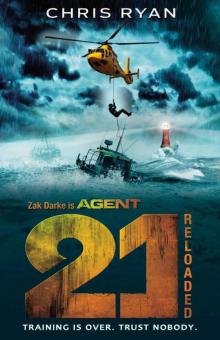 Agent 21: Reloaded: Book 2
Agent 21: Reloaded: Book 2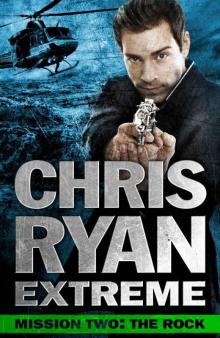 Chris Ryan Extreme: Hard Target: Mission Two: The Rock
Chris Ryan Extreme: Hard Target: Mission Two: The Rock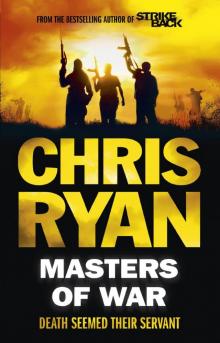 Masters of War
Masters of War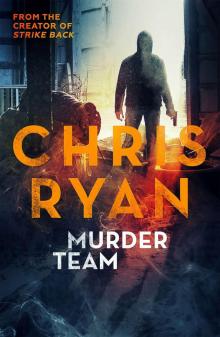 Murder Team
Murder Team War Dog
War Dog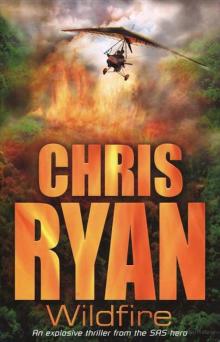 Wildfire cr-2
Wildfire cr-2 Survival
Survival The One That Got Away - Junior edition
The One That Got Away - Junior edition The Hit List
The Hit List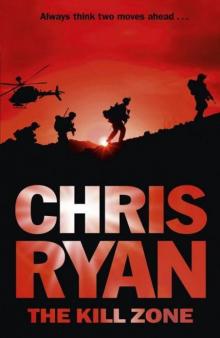 The Kill Zone
The Kill Zone Medal of Honor
Medal of Honor Battleground
Battleground Twister
Twister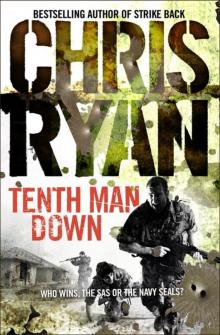 Tenth Man Down gs-4
Tenth Man Down gs-4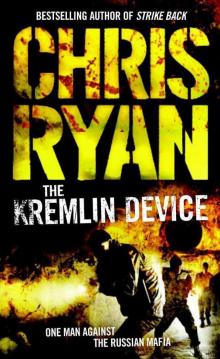 The Kremlin Device gs-3
The Kremlin Device gs-3 Hostage
Hostage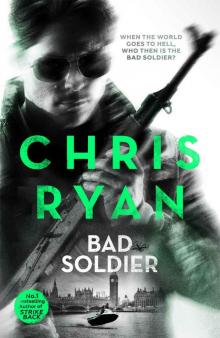 Bad Soldier: Danny Black Thriller 4
Bad Soldier: Danny Black Thriller 4 Alpha Force: Blood Money
Alpha Force: Blood Money Firefight
Firefight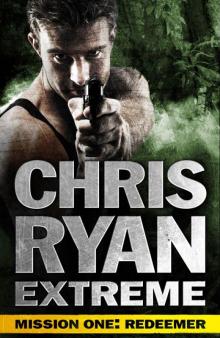 Chris Ryan Extreme: Hard Target: Mission One: Redeemer
Chris Ryan Extreme: Hard Target: Mission One: Redeemer Hit List
Hit List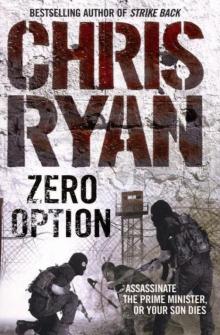 Zero Option gs-2
Zero Option gs-2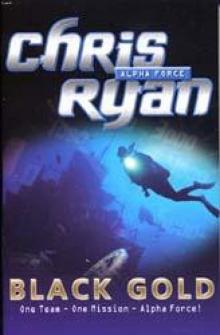 Black Gold
Black Gold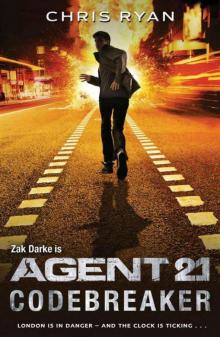 Agent 21: Codebreaker: Book 3
Agent 21: Codebreaker: Book 3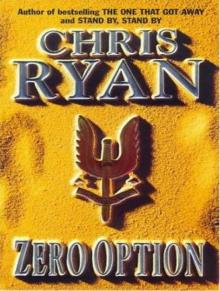 Zero Option
Zero Option Ultimate Weapon
Ultimate Weapon Tenth Man Down
Tenth Man Down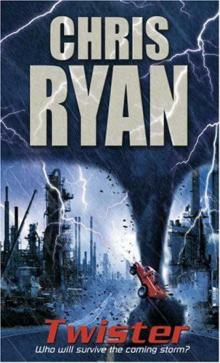 Twister cr-5
Twister cr-5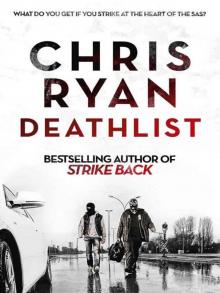 Deathlist
Deathlist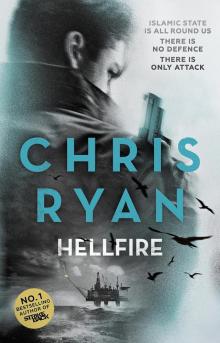 Hellfire
Hellfire Flash Flood
Flash Flood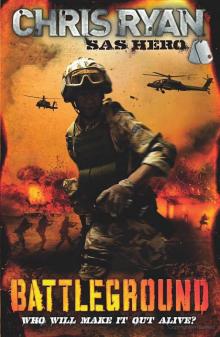 Battleground cr-6
Battleground cr-6 The Increment
The Increment